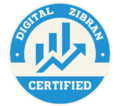In today’s fast-paced and interconnected world, digital marketing has transformed how businesses connect with their audiences, drive growth, and stay competitive. As technology evolves and consumers increasingly embrace online platforms, traditional marketing methods are no longer enough. Digital marketing, encompassing a wide range of strategies such as social media marketing, content creation, search engine optimization (SEO), and paid advertisements, has become the backbone of modern business practices. This shift marks the beginning of a new era for businesses, one that is driven by data, personalization, and an ever-expanding digital landscape.

The Rise of Digital Marketing
The advent of the internet and the proliferation of smartphones have revolutionized how consumers access information. People now spend a significant amount of time online, whether through social media, search engines, or shopping websites. According to recent studies, nearly 60% of the global population is active on the internet, and over 70% of consumers rely on digital channels to research products before making a purchase. This shift has created an immense opportunity for businesses to reach their customers where they are most engaged—online.
In this context, digital marketing provides businesses with powerful tools to engage with customers in real time, allowing for highly targeted, data-driven campaigns. Unlike traditional marketing, which often relies on broad, untargeted approaches such as TV ads, print media, or billboards, digital marketing enables businesses to precisely tailor their messaging based on user behavior, preferences, and demographics.
Key Components of Digital Marketing
- Search Engine Optimization (SEO): SEO is the practice of optimizing a website or online content to rank higher in search engine results. When users search for a product or service online, businesses that appear on the first page of search results are more likely to attract clicks and generate traffic. SEO requires both technical and creative efforts to improve website visibility, including keyword optimization, content creation, and website speed improvements.
- Social Media Marketing: Social platforms like Facebook, Instagram, Twitter, and LinkedIn have become essential marketing channels for businesses of all sizes. These platforms provide businesses with the ability to interact directly with their audience, build brand awareness, and foster customer loyalty. Social media marketing involves creating engaging content, running paid advertising campaigns, and leveraging influencer partnerships to increase reach and engagement.
- Content Marketing: Content is king in the digital age, and businesses that produce high-quality, valuable content are better positioned to attract and retain customers. Content marketing can take various forms, such as blog posts, videos, podcasts, infographics, and eBooks. By providing useful and relevant content, businesses can educate their audience, build trust, and establish themselves as industry leaders.
- Email Marketing: Despite the rise of social media, email marketing remains one of the most effective ways to nurture relationships with customers. Businesses can segment their email lists based on customer interests and behaviors, ensuring that their messages are personalized and relevant. Whether it’s a welcome email, a special promotion, or a product recommendation, email marketing allows businesses to directly engage with their audience and drive conversions.
- Pay-Per-Click (PPC) Advertising: PPC advertising involves paying for ads that appear on search engines, social media platforms, or other websites. Businesses only pay when users click on the ad, making it a cost-effective method of driving traffic to a website. Google Ads, Facebook Ads, and Instagram Ads are among the most commonly used platforms for PPC campaigns. PPC is highly measurable, allowing businesses to track ROI and optimize campaigns in real-time.
Benefits of Digital Marketing
- Cost-Effectiveness: Compared to traditional marketing methods, digital marketing is often more affordable. Small businesses, in particular, benefit from the low cost of entry and the ability to scale their campaigns as needed. Whether it’s through social media ads or email campaigns, businesses can reach large audiences at a fraction of the cost of TV or print advertising.
- Targeted Reach: One of the key advantages of digital marketing is the ability to target specific customer segments. Through data analytics and user tracking, businesses can gather insights into their audience’s interests, behaviors, and online habits. This allows for highly tailored marketing campaigns that resonate with the right people, increasing the likelihood of conversion.
- Real-Time Results: Digital marketing campaigns can be tracked and analyzed in real-time, providing immediate feedback on their effectiveness. Businesses can adjust their strategies on the fly, optimizing their approach based on performance metrics such as click-through rates (CTR), engagement, and conversions. This flexibility enables businesses to adapt quickly to changing trends or consumer behavior.
- Global Reach: The internet connects businesses to a global marketplace, allowing them to reach potential customers anywhere in the world. This expanded reach opens up new opportunities for growth and market expansion. Whether a business is looking to tap into international markets or connect with a local audience, digital marketing provides the tools and channels to do so.
The Future of Digital Marketing
As technology continues to advance, the future of digital marketing looks incredibly promising. Innovations such as artificial intelligence (AI), machine learning, and augmented reality (AR) are beginning to shape how businesses interact with consumers. AI, for example, can help businesses deliver highly personalized customer experiences by analyzing vast amounts of data and predicting consumer behavior.
Furthermore, the growing importance of privacy and data protection will shape the next generation of digital marketing strategies. As consumers become more conscious of their online data, businesses will need to navigate changing regulations while finding new ways to build trust with their audience.
Conclusion
The power of digital marketing lies in its ability to connect businesses with their customers in meaningful ways, regardless of geography or budget. By leveraging digital tools and strategies, businesses can reach new heights of engagement, brand recognition, and growth. As we move further into the digital era, businesses that embrace these new technologies and adapt to changing consumer expectations will be best positioned to thrive in an increasingly competitive marketplace. The era of digital marketing is here, and its influence will only continue to gro

